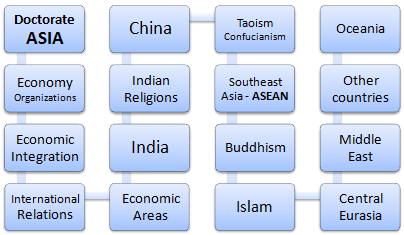Research Topics related to Asia (Doctorate)
Research Work and Thesis Plan of the Professional Doctorate in Asian Business (Online)
Doctorate Specialization in Asian Business taught by EENI Global Business School.

In the admission process, the Supervisor of the Doctorate will assign a tutor to the Doctoral Student, who will be the responsible to coordinate the student activities in the Doctoral programme.
Furthermore, a Thesis Supervisor (Director) is assigned.
- The Thesis Supervisor will guide the student in thesis planning; he is the ultimately responsible for the consistency and novelty of the thesis
- The Tutor and Supervisor (Director) can match
- Co-direction of the thesis is also allowed
Research Work and Thesis Plan (40 ECTS) of the Doctorate in Asian Business.
With the Thesis Supervisor (Director) support, the Doctoral Student must perform the appropriate research related to Asia that will lead to the realization of his thesis plan.
- The Doctoral Student must prepare and submit a thesis plan, which, as a minimum, should include the provisional thesis title, objectives pursued, methodology to be used, the means and schedule
- The Doctoral Student must study the “Research methodology” module, which will introduce to the thesis preparation method
EENI Global Business School highly appreciates that the thesis results could benefit the development of the Asian continent .
Thesis and Thesis Defense (120 ECTS) of the Doctorate in Asian Business.
Under the supervision of the Thesis Supervisor, the Doctoral Student develops and presents the research results.
- The Doctoral Student can select their subject areas related to Asia within the research parameters proposed by EENI, creating a thesis that must be completely original and own, which will be published on the EENI platform set up for this purpose
- The Directorate may authorise the thesis deposit like a compendium of publications if the requirements established by the Directorate are fulfilled
Thesis Defense by video conference.

Examples of research topics related to Asia
- Asian Economic Areas
- Asian Economic Development
- Strengths and weaknesses of the emerging Asian economies
- Asian Central States
- Asian regional economic integration
- Project financing of the Asian Development Bank
- Regional trade agreements in Asia
- Economic Cooperation in the Lancangjiang Mekong river basin and/or the Tumenjiang river basin
- Intra-Asian trade
- Asian economic institutions
- Interconnections among the Asian markets
- Foreign trade facilitation in the Asia-Pacific region
- Export costs in Asia
- Information technology and trade in Asia
- Logistics in Asia
- Infrastructure in Asia
- Investment in Asia
- Asian value chains
- Asian private sector development
- International Relations of Asia
- Asia and the global market
- Asian frontier markets
- Economic governance in Asia
- Corruption in Asia
- Asian religions and their influence on business
- Reducing the poverty in Asia
- Strengths of the Free-Trade Area of the ASEAN
- Business opportunities in the Indonesia-Malaysia-Thailand Growth Triangle (IMT-GT)
- Free trade zone of the Commonwealth of Independent States
- Customs Union of the Eurasian Economic Community
- Free movement of goods within the Union Eurasian economic (UEE)
- Free-trade areas in Asia
- Customs Union of the GCC
- Analysis of the Trade Preferential System of the OIC
- Asian bond markets..
 Enrol / Request for Information
Enrol / Request for Information

 Doctorado en Negocios en Asia
Doctorado en Negocios en Asia  Doctorat en Affaires en Asie.
Doctorat en Affaires en Asie.
(c) EENI Global Business School (1995-2024)
We do not use cookies
Top of this page


